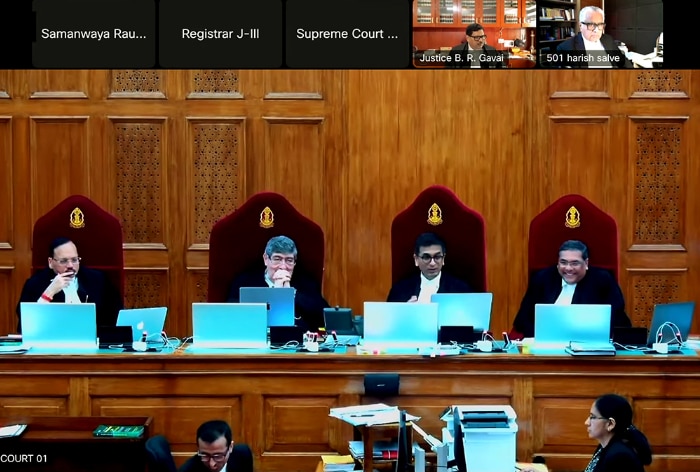As soon as the hearing of the case started today, the court first discussed the affidavit of National Conference leader Mohammad Akbar Lone.

Supreme Court Reserves Verdict On Article 370: The Supreme Court on Tuesday reserved its verdict after the hearing of Article 370 was completed. The Supreme Court was hearing a batch of 23 petitions challenging the Centre’s decision to abrogate Article 370 of the Constitution which bestowed special status on the erstwhile state of Jammu and Kashmir.
The article was revoked on August 5, 2019, and the Government trifurcated the state into Union Territories. The SC reserved its decision on September 5 after hearing the arguments of both sides in the case for 16 days.
A five-judge constitutional bench comprising Chief Justice DY Chandrachud, Justice BR Gavai, Justice Surya Kant, Justice Sanjay Kishan Kaul, and Justice Sanjiv Khanna heard the matter.
What Happened In The Court Today
As soon as the hearing of the case started today, the court first discussed the affidavit of National Conference leader Mohammad Akbar Lone. The bench also heard the rejoinder arguments of senior advocates Kapil Sibal, Gopal Subramanium, Rajeev Dhavan, Zaffar Shah, Dushyant Dave, and others on the concluding day of the hearing.
What Happened Over Last 16 Days
In the course of the hearing over the past 16 days, the top court heard Attorney General R Venkataramani, Solicitor General Tushar Mehta, senior advocates Harish Salve, Rakesh Dwivedi, V Giri, and others on behalf of the Centre and the intervenors defending the abrogation of Article 370.
The lawyers dwelt on various issues including the constitutional validity of the Centre’s August 5, 2019 decision to abrogate the provision, the validity of the Jammu and Kashmir Reorganisation Act, which split the erstwhile state into two Union Territories, challenges to the imposition of Governor’s rule in Jammu and Kashmir on June 20, 2018, and imposition of President’s rule in the erstwhile state on December 19, 2018, and its extension on July 3, 2019.
Petitions Referred To Constitution Bench In 2019
Several petitions challenging the abrogation of Article 370 and the Jammu and Kashmir Reorganisation Act, 2019 that divided the erstwhile state into two union territories – Jammu and Kashmir, and Ladakh – were referred to a Constitution bench in 2019.
Hearing Started On August 2
Supreme Court started hearing the petitions challenging the abrogation of Article 370 on August 2 by a five-judge constitution bench headed by Chief Justice DY Chandrachud. A batch of 23 pleas were heard including the petitions filed challenging the bifurcation of Jammu and Kashmir into two Union Territories (UTs) — Jammu & Kashmir, and Ladakh.
The top court bench, comprising Justices Sanjay Kishan Kaul, Sanjiv Khanna, BR Gavai and Surya Kant said the hearing in the matter will be held on a day-to-day basis except on Mondays and Fridays, which are days for hearing miscellaneous matters.
It should be noted that multiple petitions challenging abrogation of the provisions of Article 370 and the Jammu and Kashmir Reorganisation Act, 2019, which split the erstwhile state into two union territories – Jammu and Kashmir, and Ladakh- were referred to a Constitution bench in 2019.
What Is Article 370
Article 370 of the Indian constitution grants special status to Jammu and Kashmir which has been the subject of dispute between India, Pakistan since 1947. Jammu and Kashmir was governed by India as a state from 17 November 1952 to 31 October 2019, and Article 370 gave the power to have a separate constitution, a state flag, and autonomy of internal administration.
Article 370, drafted in Part XXI of the Indian constitution titled “Temporary, Transitional and Special Provisions”, stated that the Constituent Assembly of Jammu and Kashmir would be empowered to recommend the extent to which the Indian constitution would apply to the state.
Article 370 Revoked On August 5, 2019 And State Bifurcated Into Two Union Territories
However, the Centre on 5 August 2019 issued a Presidential Order superseding the 1954 order, making all the provisions of the Indian constitution applicable to Jammu and Kashmir. The order was based on the resolution passed in both houses of India’s parliament with two-thirds majority.
Union Home Minister Amit Shah on August 5, 2019 announced the scrapping of Article 370 that gave special status to Jammu and Kashmir in Rajya Sabha. Soon after the announcement, a Constitution (application to Jammu and Kashmir) Order 2019 by the President of India was published in the Gazette of India.
Speaking in Rajya Sabha, Amit Shah called it a historic moment as the Article 370 was a “hindrance for growth of the people of Jammu and Kashmir”. It never let J&K unite with India and people lived in poverty because of the special status.
(With PTI inputs)
